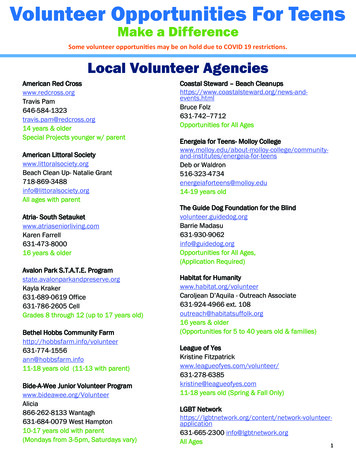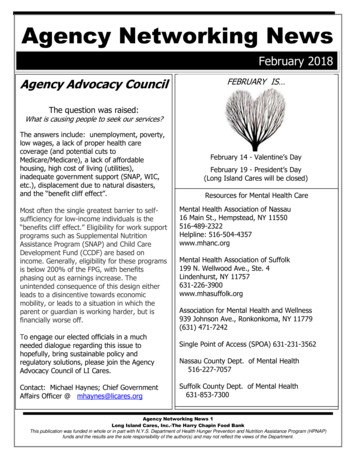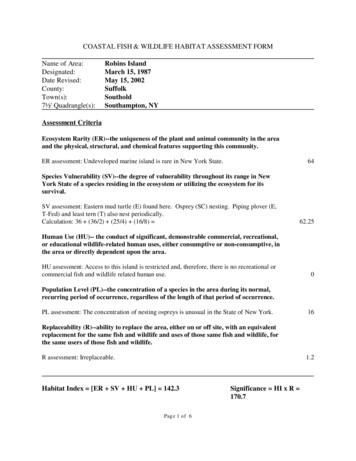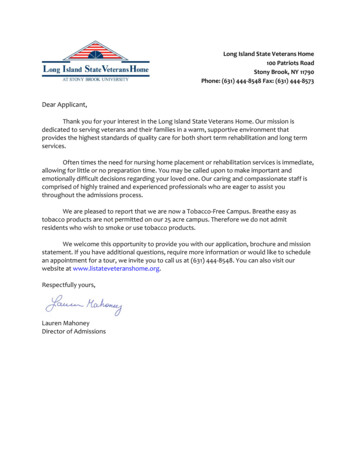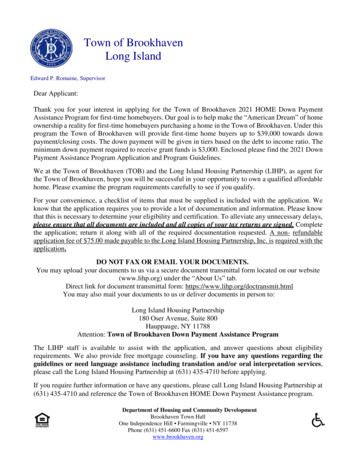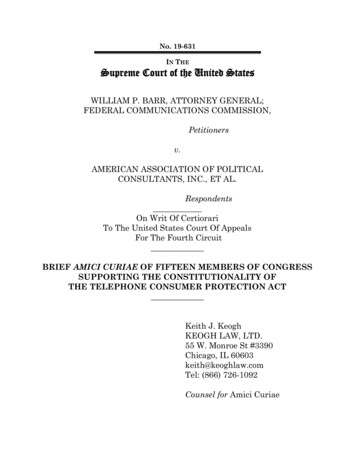
Transcription
No. 19-631IN THESupreme Court of the United StatesWILLIAM P. BARR, ATTORNEY GENERAL;FEDERAL COMMUNICATIONS COMMISSION,Petitionersv.AMERICAN ASSOCIATION OF POLITICALCONSULTANTS, INC., ET AL.RespondentsOn Writ Of CertiorariTo The United States Court Of AppealsFor The Fourth CircuitBRIEF AMICI CURIAE OF FIFTEEN MEMBERS OF CONGRESSSUPPORTING THE CONSTITUTIONALITY OFTHE TELEPHONE CONSUMER PROTECTION ACTKeith J. KeoghKEOGH LAW, LTD.55 W. Monroe St #3390Chicago, IL 60603keith@keoghlaw.comTel: (866) 726-1092Counsel for Amici Curiae
TABLE OF CONTENTSTABLE OF AUTHORITIES . iiINTEREST OF AMICI CURIAE . 1SUMMARY OF ARGUMENT . 2ARGUMENT . 4I. The TCPA is a critical law that stops intrusions on Americans’privacy, deters scams, and protects the integrity of the telephone as ameans of communication. . 4A. A bipartisan Congress enacted the TCPA to stop the scourge ofrobocalls. . 4B. The TCPA deters countless robocalls and protects Americans fromscammers who use robocalls to prey on consumers. . 7C. Invalidating the TCPA would be disastrous for America becauseunrestricted robocalls would completely undermine the telephone as ameans of communication. . 10II. The TCPA is consistent with the First Amendment. . 13A. The TCPA regulates the means of communication, not speech. 13B. The TCPA readily withstands intermediate scrutiny. . 15C. The TCPA would also satisfy strict scrutiny. . 18CONCLUSION. 21CERTIFICATE OF COMPLIANCE . 23CERTIFICATE OF SERVICE . 24APPENDIX: LIST OF AMICI CURIAE. A-1i
TABLE OF AUTHORITIESCasesAmerican Association of Political Consultants, Inc. v. F.C.C., 923 F.3d159 (4th Cir. 2019) . 19Brickman v. Facebook, Inc., 230 F. Supp. 3d 1036 (N.D. Cal. 2017) . 18Carey v. Brown, 447 U.S. 455 (1980) . 19Dietemann v. Time, Inc., 449 F.2d 245 (9th Cir. 1971) . 14Frisby v. Schultz, 487 U.S. 474 (1988) . 19Gallion v. Charter Comms., Inc., 287 F. Supp. 3d 920 (C.D. Cal. 2018) . 18Giboney v. Empire Storage & Ice. Co., 336 U.S. 490 (1949). 14Greenley v. Laborers' Int'l Union of N. Am., 271 F. Supp. 3d 1128 (D.Minn. 2017) . 18Holt v. Facebook, Inc., 240 F. Supp. 3d 1021 (N.D. Cal. 2017) . 18Lloyd Corp. v. Tanner, 407 U.S. 551 (1972) . 14Mais v. Gulf Coast Collection Bureau, Inc., 768 F.3d 1110 (11th Cir. 2014). 17Maryland v. Universal Elections, Inc., 729 F.3d 370 (4th Cir. 2013) . 15Mejia v. Time Warner Cable, Inc., No. 15-CV-6445, 2017 WL 3278926(S.D.N.Y. Aug. 1, 2017) . 18Mims v. Arrow Fin. Servs., LLC, 565 U.S. 368 (2012) . 5Nat’l Fed'n of the Blind v. F.T.C, 420 F.3d 331 (4th Cir. 2005) . 16Osorio v. State Farm Bank, F.S.B., 746 F.3d 1255 (11th Cir. 2014) . 4Patriotic Veterans, Inc. v. Zoeller, 845 F.3d 303 (7th Cir. 2017) . 17Rowan v. United States Post Office Dep’t, 397 U.S. 728 (1970) . 14, 15Soppet v. Enhanced Recovery Co., LLC, 679 F.3d 637 (7th Cir. 2012) . 17Walters v. Nat’l Ass'n of Radiation Survivors, 473 U.S. 305 (1985) . 20Ward v. Rock Against Racism, 491 U.S. 781 (1989) . 15, 16Williams-Yulee v. Florida Bar, 575 U.S. 433 (2015) . 18StatutesTelephone Consumer Protection Act of 1991, Pub. L. No. 102-243 . passimOther Authorities137 Cong. Rec. 11310 (1991) . 4137 Cong. Rec. 30 (1991). 4Americans Hit by Over 58 Billion Robocalls in 2019, Says YouMailRobocall Index, Cision PR Newswire Jan 15, 2020 . .8Elaine S. Povich, States Try to Silence Robocalls, But They’re Worse ThanEver, Pew Research Ctr. (July 25, 2018) . 11ii
FCC, FCC ISSUES 120 MILLION FINE FOR SPOOFED ROBOCALLS(2018), ghborspoofing-robocall-operation-120-million. . 9, 10FTC, National Do Not Call Registry Data Book for Fiscal Year 2019(2019) . 7, 8In re Rules & Regulations Implementing the Telephone ConsumerProtection Act of 1991, 18 FCC Rcd. 14014 (2003) . 17It’s Not Just You—Americans Received 30 Billion Robocalls Last Year,NBC News, Jan. 17, 2018 . 8S. Rep. No. 102-178 (1991) .18S. Rep. No. 116-41 (2019) . 10S.1462 – Telephone Consumer Protection Act of 1991 - Actions,Congress.gov, ebill/1462/actions . 6, 7SBA Office of Advocacy, 2018 Small Business Profile ocacy/2018-Small-BusinessProfiles-US.pdf . 12Telephone Robocall Abuse Criminal Enforcement and Deterrence Act,Pub. L. No. 116-105 (2019) . 10, 20Tim Harper, Why Robocalls are Even Worse Than You Thought,Consumer Reps. (May 15, 2019) . 11Yes, It’s Bad. Robocalls, and Their Scams, Are Surging, N.Y. Times (May6, 2018) . 8, 9iii
INTEREST OF AMICI CURIAE1Amici are Members of Congress, some of whom were instrumentalin the enactment of the Telephone Consumer Protection Act (TCPA), 47U.S.C. §227 (hereinafter TCPA), and all of whom have had experiencewith Congress’ role in legislative oversight of the TCPA. Thus, amiciare particularly well placed to provide the Court with background onthe text, structure, and history of the TCPA and the manner in which itwas intended to operate.Amici have unique knowledge and a strong interest in ensuringthat the TCPA is construed by the federal courts in accord with its textand purpose.A full listing of congressional amici appears in Appendix A.Pursuant to Rule 37.6, Amicus Curiae affirms that no counsel for a party authoredthis brief in whole or in part, and no counsel or party made a monetary contributionintended to fund the preparation or submission of this brief. No person other thanAmicus Curiae, its members, or its counsel made a monetary contribution to itspreparation or submission. Respondents’ letters consenting to the filing of amicusbriefs in support of either party has been filed with the Clerk. Petitioners haveseparately consented to this amicus brief.11
SUMMARY OF ARGUMENTIn 1991, Congress enacted the TCPA to stop the scourge of robocallsbecause “[b]anning such automated or prerecorded telephone calls. . . is theonly effective means of protecting telephone consumers from this nuisanceand privacy invasion.” Telephone Consumer Protection Act of 1991, Pub.L. No. 102-243, 105 Stat. 2394–95. The TCPA remains an essential, if notmore essential, piece of legislation today. By restricting calls made to cellphones using robocall technology, among other provisions, the TCPAprevents a countless number of unwanted robocalls every year, every day,and indeed every hour and minute, from intruding on Americans’ privacy,scamming their wallets, and overwhelming our confidence in the nation’stelephone networks.The TCPA does not and was never intended to restrict speech, asshown by Congress’ finding that the FCC should design rules “consistentwith the free speech protections embodied in the First Amendment.”Telephone Consumer Protection Act of 1991, Pub. L. No. 102-243, 105 Stat.2395. The TCPA merely regulates communications when particulartechnologies are employed based on the relationship between the parties.Under any relevant level of scrutiny, the TCPA restrictions on automated2
calling technologies are an appropriate mechanism for protectingAmericans from the plague of unwanted robocalls. Thus, the TCPA is alsofully consistent with the First Amendment.3
ARGUMENTI.The TCPA is a critical law that stops intrusions onAmericans’ privacy, deters scams, and protects theintegrity of the telephone as a means ofcommunication.A. A bipartisan Congress enacted the TCPA to stop the scourgeof robocalls.Enacted by Congress in 1991, the TCPA is a landmark law designedto protect all Americans from the aggravation and inconvenience ofprerecorded or automated calls to cellular telephones, telemarketing calls,and unwanted junk faxes.“Senator Hollings, the TCPA’s sponsor, described these calls as ‘thescourge of modern civilization. They wake us up in the morning; theyinterrupt our dinner at night; they force the sick and elderly out of bed;they hound us until we want to rip the telephone out of the wall.’” Osoriov. State Farm Bank, F.S.B., 746 F.3d 1242, 1255–56 (11th Cir. 2014)(quoting 137 Cong. Rec. 30821 (1991)). Similarly, Congressman Markeynoted “the aim of this legislation is to secure an individual’s right toprivacy that might be unintentionally intruded upon by these newtechnologies. For this reason the legislation addresses live unsolicitedcommercial telemarketing to residential subscribers.” 137 Cong. Rec.4
11310 (1991).Congressional findings in 1991 underpinning the TCPA elaborate onthese concerns. Specifically, Congress expressly found:(5) Unrestricted telemarketing can be an intrusive invasion ofprivacy and, when an emergency or medical assistance telephone lineis seized, a risk to public safety.(6) Many consumers are outraged over the proliferation of intrusive,nuisance calls to their homes from telemarketers.(12) Banning such automated or prerecorded telephone callsto the home, except when the receiving party consents to receivingthe call or when such calls are necessary in an emergency situationaffecting the health and safety of the consumer, is the onlyeffective means of protecting telephone consumers from thisnuisance and privacy invasion.(13) While the evidence presented to the Congress indicates thatautomated or prerecorded calls are a nuisance and an invasion ofprivacy, regardless of the type of call, the Federal CommunicationsCommission should have the flexibility to design different rules forthose types of automated or prerecorded calls that it finds are notconsidered a nuisance or invasion of privacy, or for noncommercialcalls, consistent with the free speech protections embodied in theFirst Amendment of the Constitution.Telephone Consumer Protection Act of 1991, Pub. L. No. 102-243, 105 Stat.2394 – 95; see generally, Mims v. Arrow Fin. Servs., LLC, 565 U.S. 368,371–73 (2012) (stating that TCPA “bans certain practices invasive ofprivacy”).Specifically on the issue of robocalls, the TCPA places “restrictions5
on the use of automated telephone equipment” to stem “the proliferation ofintrusive, nuisance calls . . . from telemarketers.” Telephone ConsumerProtection Act of 1991, Pub. L. No. 102-243, 105 Stat. 2394–95. Automatedcalling technology gave telemarketers a cheap and scalable business modelfor inundating the public, resulting in an explosion of nuisance calls. Id. at2394 (“The use of the telephone to market goods and services to the homeand other businesses is now pervasive due to the increased use of costeffective telemarketing techniques . . . More than 300,000 solicitors callmore than 18,000,000 Americans every day.”)Similarly, Congress understood the specific harms that could resultfrom a consistent bombardment of mobile devices and so forbade anyperson from making any call using an automatic telephone dialing systemto any telephone number assigned to cellular telephone service, unlessmade “for emergency purposes” or with the “prior express consent of thecalled party.” 47 U.S.C. § 227(b)(1)(A)(iii) (2018).The TCPA is the product of overwhelming bipartisan support,enjoying both Democratic and Republican co-sponsors in Senate, andpassing both houses by voice vote in November 1991. S.1462 – ress.gov,
e-bill/1462/actions.B. The TCPA deters countless robocalls and protects Americansfrom scammers who use robocalls to prey on consumers.Since 1991, the TCPA has stopped a countless number of calls fromreaching mobile phones that sit in people’s pockets, purses, andautomobiles. Public and private enforcement has helped discouragetelemarketers and others from using automated calling technology tocontact consumers without their prior consent.In 2003, Congress bolstered the TCPA by passing the Do-Not-CallImplementation Act, 15 U.S.C. § 6151–6155, thereby authorizing theFederal Trade Commission (FTC) to establish the national Do Not CallRegistry to facilitate compliance with the TCPA’s prohibition on callinglandlines. The Do Not Call Registry provides a wildly popular means forcitizens to notify telemarketers and others that their calls are unwelcome,with 239,472,857 registered phone numbers as of 2019. FTC, National DoNot Call Registry Data Book for Fiscal Year 2019 5 (2019).Nevertheless, the need for the TCPA’s protections is ongoing asautomated telephone calls continue to proliferate. “Unwanted calls are farand away the biggest consumer complaint to the FCC with over 200,000complaints each year – around 60 percent of all the complaints [the FCC]7
receive[s].” FCC, The FCC’s Push to Combat Robocalls & ives/fccs-push-combat-robocallsspoofing. Likewise, in each of fiscal years 2018 and 2019, the FTC receivedover 5 million complains about unwanted telemarketing calls. FTC,National Do Not Call Registry Data Book for Fiscal Year 2019 6 (2019).The FTC’s figures almost certainly understate the problem’s scope asmany consumers do not contact the FTC to make a complaint. It has beenreported that Americans received over 30 billion robocalls in 2017 alone.Herb Weisbaum, It’s Not Just You—Americans Received 30 BillionRobocalls Last Year, NBC News, Jan. 17, 2018. The number of robocallshas almost doubled in just two years with 58.5 billion robocalls reportedfor 2019. See Americans Hit by Over 58 Billion Robocalls in 2019, youmail-robocall-index-300987126.html.Likewise, The New York Times has reported extensively on the explodingnumber of robocall complaints and widespread consumer outrage aboutillegal telemarketing. Gail Collins, Let’s Destroy Robocalls, N.Y. Times,Mar. 1, 2019; Tara Siegel Bernard, Yes, It’s Bad. Robocalls, and Their8
Scams, Are Surging, N.Y. Times, May 6, 2018.This explosion of unwanted robocalls has occurred despite theprotections and penalties provided by the TCPA. Thus, it is self-evidentthat without those protections and penalties, the already-enormousnumber of unwanted robocalls would exponentially increase, as the lowcost and high scalability of automated call technology would grant anyonewith a product or service the unfettered ability to assault the full publicwith a non-stop wave of unwanted calls around the clock.Since the TCPA’s initial passage in 1991, robocalls have become aneven more pernicious problem because scammers are increasingly usingrobocalling technology to perpetrate their schemes, often targeting seniorcitizens and other vulnerable populations. Scammers are using spoofingtechnology (which allows them to fraudulently make it look like their callsare coming from a neighbor or a trusted entity) in conjunction withautomation to make robocalls which target and reach an enormous numberof vulnerable consumers. For example, in a span of three month between2015 and 2016, Adrian Abramovich, allegedly made 96 million spoofedrobocalls to trick consumers into sales pitches for vacation packages. FCC,FCC ISSUES 120 MILLION FINE FOR SPOOFED ROBOCALLS (2018),9
ghbor-spoofingrobocall-operation-120-million. In 2019, Congress determined that thesescam robocalls are a growing concern and estimated that “in 2019, nearly50 percent of all calls to mobile phones will be scam robocalls.” S. Rep. No.116-41, 2–3 (2019).To address the problem of scam robocalls, Congress passed theTelephone Robocall Abuse Criminal Enforcement and Deterrence(TRACED) Act in 2019 with broad bipartisan support. Telephone RobocallAbuse Criminal Enforcement and Deterrence Act, Pub. L. No. 116-105(2019). The TRACED Act tackled the issue of spoofing and enhanced theenforcement of the TCPA via increased penalties and a longer statute oflimitations. Id. Congress enacted these changes to “enable the FCC tobetter pursue bad actors” and considers increased TCPA enforcement to bean important component of punishing and deterring criminal robocallviolations. S. Rep. No. 116-41, 5–6 (2019).C. Invalidating the TCPA would be disastrous for Americabecause unrestricted robocalls would completely underminethe telephone as a means of communication.Even with the TCPA in place, robocalls are already threatening theviability of the telephone as a useful means of communication for10
commerce, for government use, or just to keep in touch with one another.Lately, Americans have been screening all of their calls, causing bothknown and unknown consequences. Many people now refuse to answercalls from unfamiliar sources, sometimes leading to harmful results. See,e.g., Tim Harper, Why Robocalls are Even Worse Than You Thought,Consumer Reps., May 15, 2019 (reporting delays in medical treatmentbecause people no longer respond to calls from medical specialists); TaraSiegel Bernard, Yes, It’s Bad. Robocalls, and Their Scams, Are Surging,N.Y. Times, May 6, 2018 (reporting that one doctor ignored a call from theemergency room because he assumed it was a robocall).In one survey, 70 percent of respondents said they stopped answeringcalls from numbers they do not recognize. Octavio Blanco, Mad AboutRobocalls, Consumer Reps., Apr. 2, 2019. As a result, robocallers simplydial more numbers in order to reach the same number of people. Elaine S.Povich, States Try to Silence Robocalls, But They’re Worse Than Ever, PewStateline Blog (July 25, 2018), obocallsbut-theyre-worse-than-ever.11
Now imagine what American phone usage would look like if theTCPA were invalidated, leaving no restrictions on robocalling. Forexample, with over 30 million small businesses in the U.S., SBA Office l-BusinessProfiles-US.pdf, if even a small percentage of them started to makethousands of calls each day,2 that alone would generate annual unwantedautomated calls potentially numbering in the trillions. Imagine further iflarger businesses and other entities started to robocall our mobile phones,freed of the need to gain our consent before calling. The scammers are nowviolating the law and calling without consent, but legitimate businesses—who would likely love to touch base with consumers for surveys andreminders, as well as telemarketing and other purposes—would be free tocall as often as they wish.The constant bombardment of our mobile devices could render themeffectively useless. As a means of protecting themselves, some consumersmight simply disable the voice calls feature on their phones, possiblycausing medical personnel and businesses to miss critical calls andIt is a straightforward process to use an internet dialing system to mass dialnumbers for very little cost. This technology is readily available to small businesses.212
preventing the legitimate and necessary communications and commercefrom flowing from one phone to another. The impact would be dramaticand devastating. So just as the number of unwanted calls continues to growdespite the existence and enforcement of the TCPA, in the absence of thesafeguards provided by the TCPA, the number of unwanted calls wouldgrow exponentially, as businesses and others could make robocalls withimpunity. This robocall explosion would render our cell phones utterlyuseless as a means of communication.II.The TCPA is consistent with the First Amendment.A. The TCPA regulates the means of communication, notspeech.As an initial matter, the TCPA does not, and was not designed to,restrict speech. It aims to regulate a particular means of communicationto facsimile machines, home numbers on the Do Not Call Registry, andautomated telephone calls or prerecorded calls to cellular telephonesmade without the called party’s consent.This is entirely permissible because “[i]t has never been deemed anabridgement of freedom of speech or press to make a course of conductillegal merely because the conduct was in part initiated, evidenced, orcarried out by means of language, either spoken, written, or printed.”13
Giboney v. Empire Storage & Ice. Co., 336 U.S. 490, 502 (1949). Moreover,“[t]he First Amendment is not a license to trespass, to steal, or to intrudeby electronic means into the precincts of another person’s home or office.”Dietemann v. Time, Inc., 449 F.2d 245, 249 (9th Cir. 1971).Simply put, Plaintiffs have no First Amendment Right to make thecalls at issue. The First Amendment has never been held to authorizetrespasses (here on businesses or consumers’ cellular telephones) for thepurpose of engaging in even the most highly-protected speech, much lessto disseminate unwanted advertising or calls. Lloyd Corp. v. Tanner, 407U.S. 551, 568 (1972). Likewise, in Rowan v. United States Post Office Dep’t,397 U.S. 728 (1970), this Court upheld a statute authorizing the post officeto require advertisers remove names from their mailing lists and stop allfuture mailings upon request. In rejecting the First Amendment challengebrought by the industry including publishers and operators of variousmail-order advertisers, this Court held:. . . Weighing the highly important right to communicate, butwithout trying to determine where it fits into constitutionalimperatives, against the very basic right to be free from sights,sounds, and tangible matter we do not want, it seems to us thata mailer's right to communicate must stop at the mailbox of anunreceptive addressee. . . . To hold less would tend to license aform of trespass and would make hardly more sense than to saythat a radio or television viewer may not twist the dial to cut14
off an offensive or boring communication and thus bar itsentering his home. Nothing in the Constitution compels us tolisten to or view any unwanted communication, whatever itsmerit; we see no basis for according the printed word or picturesa different or more preferred status because they are sent bymail. The ancient concept that ‘a man's home is his castle’ intowhich ‘not even the king may enter’ has lost none of its vitality,and none of the recognized exceptions includes any right tocommunicate offensively with another. . . . We thereforecategorically reject the argument that a vendor has a rightunder the Constitution or otherwise to send unwanted materialinto the home of another. If this prohibition operates to impedethe flow of even valid ideas, the answer is that no one has aright to press even ‘good’ ideas on an unwilling recipient. . . .The asserted right of a mailer, we repeat, stops at the outerboundary of every person's domain.Id. At 736 – 38. Requiring consent prior to robocalling a person’s cellularphone is simply not an infringement of the First Amendment.B. The TCPA readily withstands intermediate scrutiny.As a content-neutral restriction on the manner in which certain callsmay be made, at most the TCPA’s automated call restrictions are subjectto intermediate scrutiny. See Maryland v. Universal Elections, Inc., 729F.3d 370, 376 (4th Cir. 2013) (applying intermediate scrutiny to TCPAautodialer requirements). A law satisfies that standard if it “promotes asubstantial government interest that would be achieved less effectivelyabsent the regulation,” and does not “burden substantially more speechthan is necessary to further the government's legitimate interests.” Ward15
v. Rock Against Racism, 491 U.S. 781, 799 (1989) (internal citations andquotations omitted). To withstand review, the law “need not be the leastrestrictive or least intrusive means” of serving the government'ssignificant interests. Id. at 798.Courts have previously upheld restrictions on the time, place, ormanner in which calls may be made under this standard. See, e.g.,Universal Elections, 729 F.3d at 377 (upholding a TCPA provisionrequiring that all artificial or prerecorded telephone messages disclosethe caller's identity and telephone number); Nat’l Fed'n of the Blind v.F.T.C, 420 F.3d 331, 341–43 (4th Cir. 2005) (upholding FTC regulationsimposing disclosure requirements, time-of-day restrictions, and otherrules with respect to certain charitable calls).Congress found that the use of autodialers and artificial orprerecorded voices presents a significant threat to the privacy interest ofAmericans. Telephone Consumer Protection Act of 1991, Pub. L. No. 102243, 105 Stat. 2394–95 (finding that unrestricted telemarking can be “anintrusive invasion of privacy” and that a ban is the only effective meansof limiting this intrusion).These concerns have been echoed by virtually every court to16
examine the TCPA or a state court analog. “The lack of a live personmakes the call frustrating for the recipient but cheap for the caller, whichmultiplies the number of these aggravating calls in the absence of legalcontrols.” Patriotic Veterans, Inc. v. Zoeller, 845 F.3d 303, 306 (7th Cir.2017); see also, Moser v. F.C.C., 46 F.3d 970, 974 (9th Cir. dautomatedtelemarketing calls as a threat to privacy”), Mais v. Gulf Coast CollectionBureau, Inc., 768 F.3d 1110, 1114, (11th Cir. 2014) (citing In re Rules &Regulations Implementing the Telephone Consumer Protection Act of1991, 18 FCC Rcd. 14014, 14022 (2003)) (recognizing the nuisance andprivacy invasion caused by automated telephone calls where theconsumer is forced to deal with the annoyance and aggravation ofabandoned calls); Soppet v. Enhanced Recovery Co., LLC, 679 F.3d 637,639 (7th Cir. 2012) (“[P]redictive dialers lack human intelligence and,like the buckets enchanted by the Sorcerer's Apprentice, continue untilstopped by their true master. Meanwhile Bystander is out of pocket thecost of the airtime minutes and has had to listen to a lot of uselessvoicemail.”).Accordingly, the TCPA easily passes intermediate scrutiny.17
C. The TCPA would also satisfy strict scrutiny.Even if the TCPA was subject to strict scrutiny, it would withstandreview because it is “narrowly tailored to serve a compelling interest.”Williams-Yulee v. Florida Bar, 575 U.S. 433, 442 (2015) (upholding ajudicial solicitation ban under that standard).The district court is not alone in correctly holding the automated callrestriction satisfies this demanding standard of review. See, e.g., Gallionv. Charter Comms., Inc., 287 F. Supp. 3d 920 (C.D. Cal. 2018); Greenleyv. Laborers' Int'l Union of N. Am., 271 F. Supp. 3d 1128 (D. Minn. 2017);Mejia v. Time Warner Cable, Inc., No. 15-CV-6445, 2017 WL 3278926(S.D.N.Y. Aug. 1, 2017); Holt v. Facebook, Inc., 240 F. Supp. 3d 1021(N.D. Cal. 2017); Brickman v. Facebook, Inc., 230 F. Supp. 3d 1036 (N.D.Cal. 2017).As noted above, Congress enacted the TCPA to protect the publicfrom automated phone calls and the attendant invasion of personal andresidential privacy. S. Rep. No. 102-178, at 5 (1991). Before thisrestriction was enacted, “[m]any consumers [we]re outraged over theproliferation of intrusive, nuisance calls to their homes” and cell phones.Telephone Consumer Protection Act of 1991, Pub. L. No. 102-243, 10518
Stat. 2394. The government’s interest in preventing such calls andthereby “protecting the well-being, tranquility, and privacy of the homeis of the highest order.” Carey v. Brown, 447 U.S. 455, 471 (1980); seeFrisby v. Schultz, 487 U.S. 474, 484–85 (1988) (“[W]e have repeatedlyheld that individuals are not required to welcome unwanted speech intotheir own homes and that the government may protect this freedom.”).In addition, Plaintiffs conc
phones using robocall technology, among other provisions, the TCPA prevents a countless number of unwanted robocalls every year, every day, and indeed every hour and minute, from intruding on Americans' privacy, scamming their wallets, and overwhelming our confidence in the nation's telephone networks.



